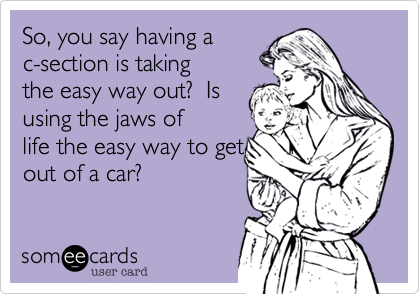What to Expect a Day, Week, and Month After Having a C-Section
You may not be able to move much. If you had an epidural for the procedure and it was left in place, you’ll have limited activity, says Clark Johnson, M.D., an obstetrician at Johns Hopkins Hospital in Baltimore. It’s usually taken out the first day post-op, though, so you should regain mobility pretty soon.
You could be in a ton of pain, or it might not be so bad. This will vary based on numerous factors, says Alyssa Dweck, M.D., assistant clinical professor of ob-gyn at Mount Sinai School of Medicine in New York City. These include: your own general health before the surgery, whether or not you were in labor beforehand, and whether or not the C-section was scheduled or an emergency one. You’ll be given pain meds every four to eight hours, depending on your level of discomfort, says Melissa Walsh M.D., ob-gyn attending physician, department of obstetrics, gynecology, and women’s health in the Montefiore Health System.
RELATED: Why Your Ob-Gyn Doesn’t Want You to Have a Scheduled C-Section
You’ll be very puffy. Due to the many of liters of fluid I was given during my C-section, I blew up like a marshmallow. And it can take a few days to release these fluids from the body, says Lauren F. Streicher, M.D., associate clinical professor of obstetrics and gynecology at Northwestern Memorial Hospital and author of Sex Rx: Hormones, Health, and Your Best Sex Ever. So expect to urinate and sweat like crazy for the first 48 hours afterwards.

You’ll also be constipated. This could take quite a few days to resolve itself. The hospital will give you meds to help get things going again. Walking helps your body with this particular issue, too, says Walsh.
Your vag will bleed. Yep. Even if you didn’t experience labor, this will still happen. That’s because your body has to expel all of the extra blood and tissue it needed to nourish your baby in the womb. This discharge is called lochia. Expect the heaviest bleeding in the first three to five days post-delivery. My hospital had generous maxi pads and the most comfortable undies. They were easy on my incision and helped with the bulky pads.
What to Expect…a Week After the C-Section
You’ll still have pain. Walsh says you may still need painkillers intermittently, but it’s at this point that doctors like to gradually wean you off them.
You won’t be able to do any heavy lifting. Strenuous exercise and household chores are not advised until six to eight weeks later, depending on what your ob-gyn says about how you’re healing.
RELATED: Something Called a ‘Gentle C-Section’ Now Exists
Your appetite might suck. As you’re healing from your C-section, your bowel may become irritated due to inflammation from the surgery, says Walsh. So, you may not feel very up to eating a week out. (Personally, I was starving!)
You’ll need to get your staples removed. Shortly after the week mark—from 10 to 14 days—any abdominal dressings, tape, or staples are removed when you visit your practitioner to have your incision viewed.
What to Expect…a Month After the C-Section
You might be numb at the incision area. Dweck says it’s common to feel numbness here for weeks after a C-section. A very small percentage of women may experience this permanently, but for the most part, it’ll go away over time. I was numb for a few months.

You might spot. Don’t be surprised if you continue to bleed or spot for up to six to eight weeks post-surgery. If something seems out of the ordinary (like there’s A LOT of blood), visit your ob-gyn.
You should feel almost normal. One month after, you should expect to be back to your baseline sense of health, says Johnson. You might have occasional pain or discomfort, though, since your core and abdominal muscles are still healing. Walsh suggests starting exercises like Kegels to help build up your core strength around four to six weeks post-surgery. Learn how to do kegels the right way.
RELATED: How Having a C-Section Affects Your Sex Life
What to Expect…Long-Term
You may have incontinence issues. Peeing your pants? Streicher recommends a tool called the Elvie ($199, elvie.com), which helps rebuild your pelvic floor muscles. It basically ensures that you do Kegels correctly to help support the bladder, rectum, and vagina.
You could get emotional. The ultimate goal of any birth is a healthy mom and baby, says Dweck. Even so, many women feel shame or anger if they didn’t plan on a C-section. I felt disappointed for quite some time that I wasn’t able to push my baby out, but now, five years later, I don’t mind at all. I’m just happy my daughter is healthy. Finding a support group of other moms who understand (whether that’s in person or virtually) is a great way to cope.